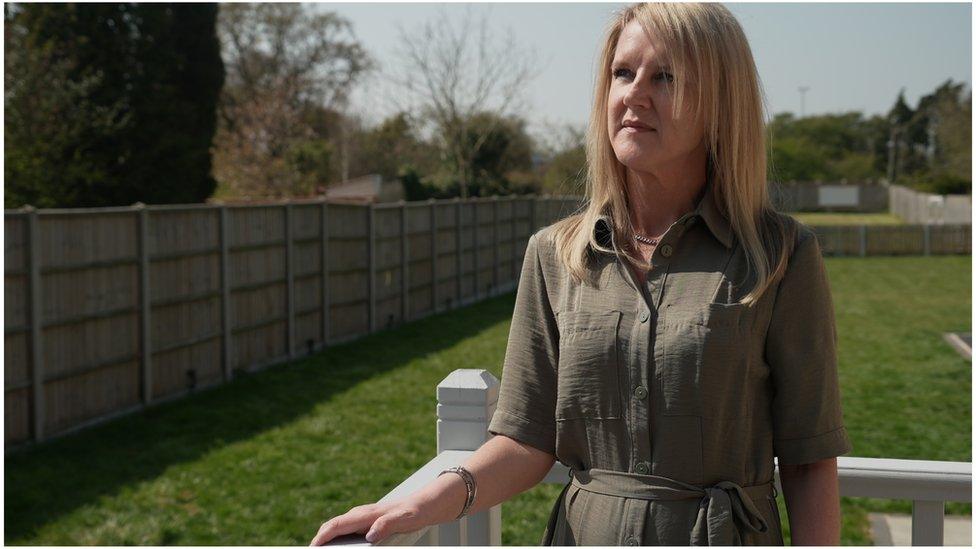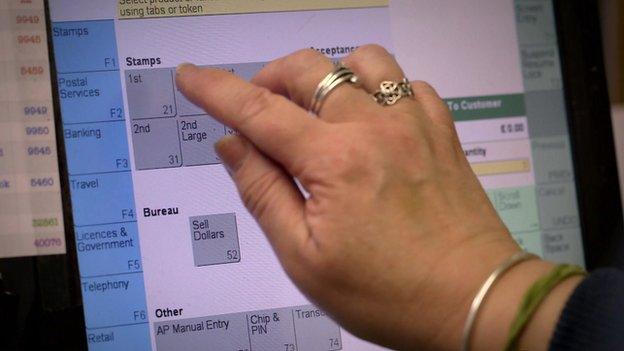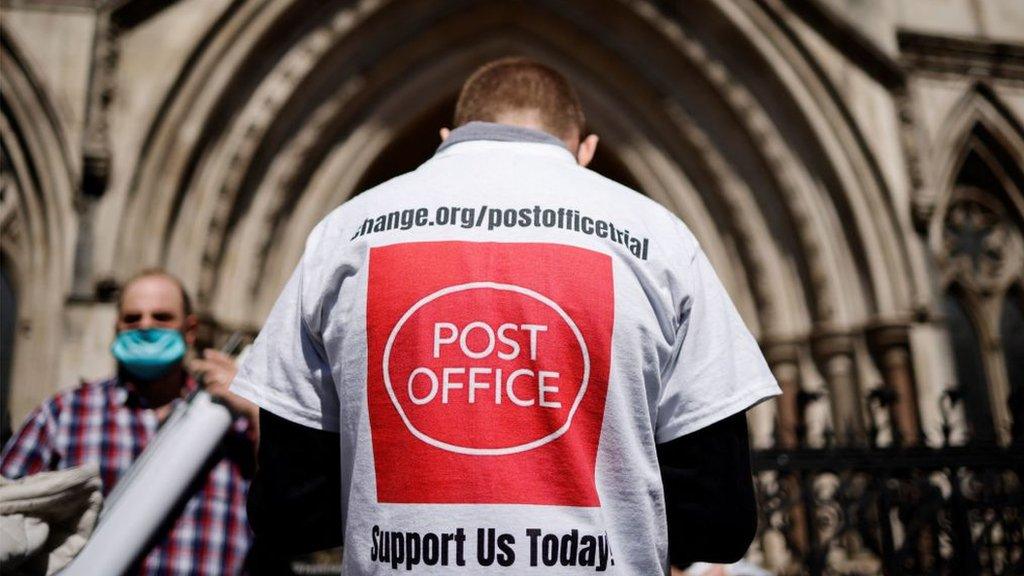Post Office scandal: Postmasters await Appeal Court ruling
- Published

Seema Misra, Jo Hamilton, and Janet Skinner (left to right) are fighting to clear their names
A group of 42 sub-postmasters and postmistresses will learn later whether convictions for stealing money will be quashed amid a Post Office IT scandal.
They were convicted, with some imprisoned, after the Post Office installed the Horizon computer system in branches.
The system was flawed and postmasters and postmistresses have spent years trying to clear their names.
Judges at the Court of Appeal will deliver their ruling later.
Following the convictions - including theft, fraud and false accounting - some former postmasters went to prison, were shunned by their communities and struggled to secure work.
Some lost their homes, and even failed to get insurance owing to their convictions. Some have since died.
They always said the fault was in the computer system, which had been used to manage post office finances since 1999.

Janet Skinner says she is nervous about the result
Among them was Janet Skinner, who ran a post office in Hull. She was imprisoned in 2007 for nine months over a shortfall of £59,000 - a case which she said "destroyed everything". Like others, she said she had no idea other sub-postmasters and sub-postmistresses were being prosecuted and convicted.
She was taken away from her two children to go to prison, and - after her release - had a job offer taken away owing to her criminal conviction.
Now she is waiting for the Appeal Court's verdict. "I'm so nervous, because I know my life is in the hands of three judges," she said.

'I had to sell everything'

Karen has been fighting to clear her late husband Julian's name
Julian Wilson owned and ran the Astwood Bank village post office branch in Worcestershire. He was convicted following a Post Office prosecution in 2008.
He died of cancer in 2016, but his widow Karen has been fighting to clear his name.
"He couldn't get a job, so I had three jobs. I sold everything he'd ever bought me - my engagement ring, all my jewellery. I didn't tell him," she said.
"He used to say: 'I feel I have a ball and chain with an anchor around my leg and I'm dragging it over a stormy sea, and I want somebody to cut it free because I am not a criminal.'"

In an earlier ruling, a High Court judge found the Fujitsu-developed Horizon accounting system contained "bugs, errors and defects" and that there was a "material risk" shortfalls in branch accounts were caused by the system.
In December 2019, the Post Office agreed to pay almost £58m to settle the long-running dispute with more than 500 sub-postmasters and postmistresses affected by the scandal.
The Criminal Cases Review Commission (CCRC) referred 51 cases back to the courts. Six people's convictions were overturned last year.
Later on Friday, following a hearing at the Court of Appeal in March, judges will give a ruling in 42 more cases.
In 39 cases, the Post Office did not contest that those involved "did not or could not have a fair trial", but in 35 of these cases it did challenge a second element that their convictions were "an affront to the public conscience".

What is the Horizon computer scandal?

The Horizon system is designed to record the transactions carried out in a post office branch
The Horizon system, developed by the Japanese company Fujitsu, was first rolled out in 1999 to some post offices to be used for a variety of tasks including accounting and stocktaking.
But from an early stage it appeared to have significant bugs which could cause the system to misreport, sometimes involving substantial sums of money.
Horizon-based evidence was used by the Post Office to successfully prosecute 736 people.
But campaigners fought a long and series of legal battles for compensation in the civil courts, which have been followed by referrals by the Criminal Cases Review Commission.
Listen to the background of the saga - The Great Post Office Trial on BBC Sounds
Watch the latest BBC Panorama - Scandal at the Post Office


Seema Misra was sent to prison while pregnant
Others hoping to have their names cleared include Seema Misra, who was pregnant with her second child when she was convicted of theft and sent to jail in 2010.
"Prison was my worst nightmare," she said.
Also waiting for the decision is Jo Hamilton, who was accused by the Post Office of taking £36,000 from the village shop she ran in Hampshire.
She had to give up her shop and found it difficult to get a new job due to her criminal record. Declaring the criminal record also affected everyday life, such as failing to get car insurance.
She made ends meet by doing cleaning jobs for people in her village who did not believe she was guilty. Many of them, including the local vicar, came to support her at her sentencing hearing.
"It's just gone on for so long. It's been a massive part of my life," she said.
A Post Office spokesman said: "We sincerely apologise to the postmasters affected by our historical failures.
"Throughout this appeals process we have supported the quashing of the overwhelming majority of these convictions and the judgment will be an important milestone in addressing the past."
Related topics
- Published11 February 2020

- Published11 December 2019

- Published11 December 2020

